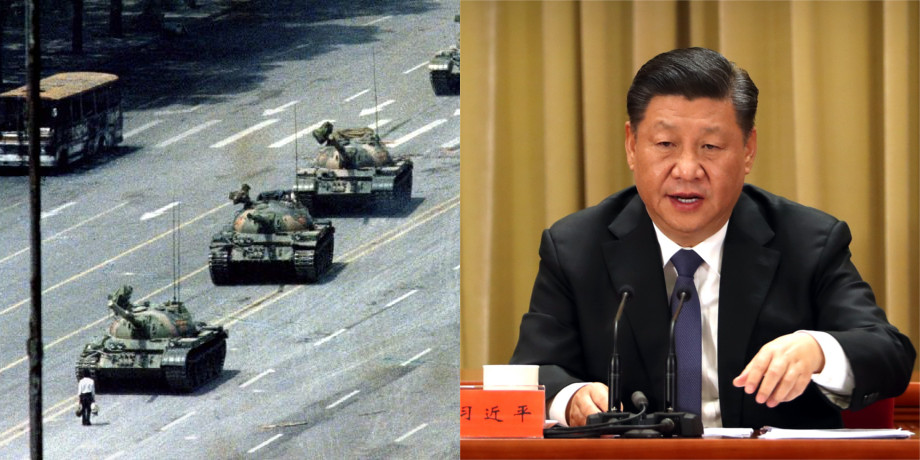Event Coverage Highlight

(CLOSED) Tiananmen Square Thirty Years Later: Is the Past a Portent of an Even More Authoritarian Future?

Photo credits: Above left, iconic “Tank Man” in Tiananmen; and above right, Chinese President Xi Jinping, photo credit: Mark Schiefelbein/Getty Images.
Registration for this event is now closed.
Co-sponsored by:
- The U.S.-Asia Law Institute at New York University
- The Center for U.S.-China Relations at the Asia Society/ChinaFile
- The Weatherhead East Asian Institute at Columbia University
Lunch and panel discussion with correspondents who covered the event: 12:30 p.m. to 2:00 p.m.
Panel discussions: 2:00 p.m. to 5:30 p.m.
Drinks and networking: 5:30 p.m. to 7:00 p.m.
Thirty years ago, as of June 4, the Chinese leadership made a crucial decision—it sent in the tanks to crush students demonstrating for greater democratic rights, killing thousands. Come listen to the stories of those students who survived and how they have fought a 30-year shadow war against the Chinese government even though they sought refuge in Western democracies and Taiwan. We also will be joined by American correspondents who covered the event and have watched as the Chinese government under President Xi Jinping has gradually closed off the Chinese people’s access to the Western news media, fearing that it might infect the people with foreign ideals and set the stage for future political stirrings.
It appears that President Xi is determined to prevent his people from ever again demanding greater political rights, as they did that spring of 1989, by instituting a sweeping crackdown on dissidents, lawyers and religious leaders and imposing greater censorship of Chinese-state owned media as well as the Internet and social media. Experts will discuss how his government has detained roughly 1 million Uyghurs and Kazakhs in the western province of Xinjiang and used sophisticated facial recognition technology backed by Artificial Intelligence and Big Data tools to control them. Different provinces and cities are experimenting with social credit rating systems that will prevent wrong-thinking Chinese from getting jobs or getting or airplanes of high-speed trains. Is Xi using advanced technology to build the most sophisticated totalitarian state in history?
SPEAKERS:
SURVIVORS:
Wu’er Kaixi, a former Tiananmen student leader and a Uyghur activist, now based in Taiwan.
Zhou Fengsuo, who led “Voice of the Students Movement on Tiananmen Square” in 1989 and spent a year in spent a year in prison. He is co-founder of Humanitarian China, which has provided aid to families of Tiananmen victims and political prisoners.
Rose Tang, who survived by crawling over a tank to escape the square. She is a former journalist and news producer, and is currently a New York-based activist.
Fang Zheng, whose legs were crushed by a tank while he was rescuing a fellow student protester. He is now President of the Chinese Democratic Education Foundation and is based in San Francisco.
CORRESPONDENTS:
Carroll Bogert, who covered the 1989 crackdown for Newsweek.
Dorinda Elliott, director for the Center for Business at the China Institute, who also covered the event for Newsweek.
Adi Ignatius, who covered the event for the Wall Street Journal. Now editor of the Harvard Business Review.
Bruce Kennedy, a broadcast journalist for CNN, NPR and others.
Dori Jones Yang, whose Businessweek cover story about the event was entitled “The Great Leap Backward.”
EXPERTS:
Teng Biao, former lawyer, law professor and law reformer who was kidnapped three times in China and is now living in enforced exile.
Jerome Cohen, faculty director of the U.S.-Asia Law Center at New York University Law School.
Sharon Hom, head of Human Rights in China.
Christina Larson, Associated Press science writer, former technology writer in China and author of a definitive article in the MIT Technology Review.
Lee Cheuk Yan, secretary of the Hong Kong Alliance In Support of Democratic Movements in China.
Mak Yin-Ting, former chair of the Hong Kong Journalists Association and a co-author of the organization’s annual report of freedom of expression in Hong Kong.
Martin Lee, founding chairman of Hong Kong’s Democratic Party who is known as its “father of democracy.
Andrew Nathan, translator of the book, The Tiananmen Papers, and professor of China’s politics and international relations at Columbia University.
Sophie Richardson, China director, Human Rights Watch, Washington, D.C.
Dexter “Tiff” Roberts, Mansfield Fellow at the University of Montana, who spent 23 years as a correspondent in Beijing.
MODERATORS:
Rebecca Blumenstein, Pulitzer Prize-winner while based in Beijing for The Wall Street Journal. Now deputy managing editor of The New York Times.
William J. Holstein, former China correspondent and former president of the OPC. Editor of the OPC book, Has the American Media Misjudged China? Head of organizing committee.
Susan Jakes, who spent 10 years in Beijing for TIME. Now editor of ChinaFile at The Asia Society.
Minky Worden, event co-organizer and an executive with Human Rights Watch.
Sheryl WuDunn, former New York Times Beijing correspondent and winner of multiple awards.
Reservations are now closed. Media coverage of afternoon panels welcomed. Contact 212 626-9220 or patricia@opcofamerica.org to make arrangements.


